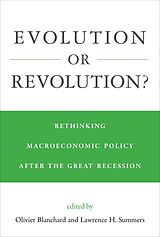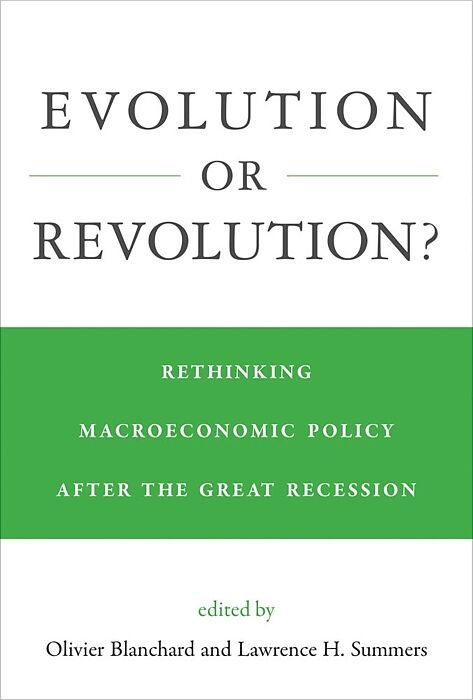Evolution or Revolution?
Einband:
Fester Einband
EAN:
9780262039369
Untertitel:
Rethinking Macroeconomic Policy after the Great Recession
Genre:
Volkswirtschaft
Autor:
Olivier Blanchard, Lawrence H. Summers
Herausgeber:
MIT Press
Anzahl Seiten:
392
Erscheinungsdatum:
16.04.2019
ISBN:
978-0-262-03936-9
Zusatztext This thought-provoking and acccessible collection of reflections by economists, central bankers, and government officials explores how the unusual circumstances that have characterized the global economy since 2007 should change economists' understanding of macroeconomic policy. Foreign Affairs Informationen zum Autor edited by Olivier Blanchard and Lawrence H. Summers Klappentext Leading economists discuss post-financial crisis policy dilemmas, including the dangers of complacency in a period of relative stability. The Great Depression led to the Keynesian revolution and dramatic shifts in macroeconomic theory and macroeconomic policy. Similarly, the stagflation of the 1970s led to the adoption of the natural rate hypothesis and to a major reassessment of the role of macroeconomic policy. Should the financial crisis and the Great Recession lead to yet another major reassessment, to another intellectual revolution? Will it? If so, what form should it, or will it, take? These are the questions taken up in this book, in a series of contributions by policymakers and academics. The contributors discuss the complex role of the financial sector, the relative roles of monetary and fiscal policy, the limits of monetary policy to address financial stability, the need for fiscal policy to play a more active role in stabilization, and the relative roles of financial regulation and macroprudential tools. The general message is a warning against going back to precrisis waysto narrow inflation targeting, little use of fiscal policy for stabilization, and insufficient financial regulation. ContributorsDavid Aikman, Alan J. Auerbach, Ben S. Bernanke, Olivier Blanchard, Lael Brainard, Markus K. Brunnermeier, Marco Buti, Benoît Coeuré, Mario Draghi, Barry Eichengreen, Jason Furman, Gita Gopinath, Pierre-Olivier Gourinchas, Andrew G. Haldane, Philipp Hildebrand, Marc Hinterschweiger, Sujit Kapadia, Nellie Liang, Adam S. Posen, Raghuram Rajan, Valerie Ramey, Carmen Reinhart, Dani Rodrik, Robert E. Rubin, Jay C. Shambaugh, Tharman Shanmugaratnam, Jeremy C. Stein, Lawrence H. Summers Zusammenfassung Leading economists discuss postfinancial crisis policy dilemmas, including the dangers of complacency in a period of relative stability. The Great Depression led to the Keynesian revolution and dramatic shifts in macroeconomic theory and macroeconomic policy. Similarly, the stagflation of the 1970s led to the adoption of the natural rate hypothesis and to a major reassessment of the role of macroeconomic policy. Should the financial crisis and the Great Recession lead to yet another major reassessment, to another intellectual revolution? Will it? If so, what form should it, or will it, take? These are the questions taken up in this book, in a series of contributions by policymakers and academics. The contributors discuss the complex role of the financial sector, the relative roles of monetary and fiscal policy, the limits of monetary policy to address financial stability, the need for fiscal policy to play a more active role in stabilization, and the relative roles of financial regulation and macroprudential tools. The general message is a warning against going back to precrisis waysto narrow inflation targeting, little use of fiscal policy for stabilization, and insufficient financial regulation. Contributors David Aikman, Alan J. Auerbach, Ben S. Bernanke, Olivier Blanchard, Lael Brainard, Markus K. Brunnermeier, Marco Buti, Benoît Curé, Mario Draghi, Barry Eichengreen, Jason Furman, Gita Gopinath, Pierre-Olivier Gourinchas, Andrew G. Haldane, Philipp Hildebrand, Marc Hinterschweiger, Sujit Kapadia, Nellie Liang, Adam S. Posen, Raghuram Rajan, Valerie Ramey, Carmen Reinhart, Dani Rodrik, Robert E. Rubin, Jay C. Shambaugh, Tharman Shanmugaratnam, Jeremy C. Stein, Lawrence H. Summers ...
Autorentext
edited by Olivier Blanchard and Lawrence H. Summers
Klappentext
Leading economists discuss post-financial crisis policy dilemmas, including the dangers of complacency in a period of relative stability.The Great Depression led to the Keynesian revolution and dramatic shifts in macroeconomic theory and macroeconomic policy. Similarly, the stagflation of the 1970s led to the adoption of the natural rate hypothesis and to a major reassessment of the role of macroeconomic policy. Should the financial crisis and the Great Recession lead to yet another major reassessment, to another intellectual revolution? Will it? If so, what form should it, or will it, take? These are the questions taken up in this book, in a series of contributions by policymakers and academics. The contributors discuss the complex role of the financial sector, the relative roles of monetary and fiscal policy, the limits of monetary policy to address financial stability, the need for fiscal policy to play a more active role in stabilization, and the relative roles of financial regulation and macroprudential tools. The general message is a warning against going back to precrisis ways—to narrow inflation targeting, little use of fiscal policy for stabilization, and insufficient financial regulation.Contributors David Aikman, Alan J. Auerbach, Ben S. Bernanke, Olivier Blanchard, Lael Brainard, Markus K. Brunnermeier, Marco Buti, Benoît Coeuré, Mario Draghi, Barry Eichengreen, Jason Furman, Gita Gopinath, Pierre-Olivier Gourinchas, Andrew G. Haldane, Philipp Hildebrand, Marc Hinterschweiger, Sujit Kapadia, Nellie Liang, Adam S. Posen, Raghuram Rajan, Valerie Ramey, Carmen Reinhart, Dani Rodrik, Robert E. Rubin, Jay C. Shambaugh, Tharman Shanmugaratnam, Jeremy C. Stein, Lawrence H. Summers
Zusammenfassung
Leading economists discuss post–financial crisis policy dilemmas, including the dangers of complacency in a period of relative stability.The Great Depression led to the Keynesian revolution and dramatic shifts in macroeconomic theory and macroeconomic policy. Similarly, the stagflation of the 1970s led to the adoption of the natural rate hypothesis and to a major reassessment of the role of macroeconomic policy. Should the financial crisis and the Great Recession lead to yet another major reassessment, to another intellectual revolution? Will it? If so, what form should it, or will it, take? These are the questions taken up in this book, in a series of contributions by policymakers and academics. The contributors discuss the complex role of the financial sector, the relative roles of monetary and fiscal policy, the limits of monetary policy to address financial stability, the need for fiscal policy to play a more active role in stabilization, and the relative roles of financial regulation and macroprudential tools. The general message is a warning against going back to precrisis ways—to narrow inflation targeting, little use of fiscal policy for stabilization, and insufficient financial regulation.Contributors
David Aikman, Alan J. Auerbach, Ben S. Bernanke, Olivier Blanchard, Lael Brainard, Markus K. Brunnermeier, Marco Buti, Benoît Cœuré, Mario Draghi, Barry Eichengreen, Jason Furman, Gita Gopinath, Pierre-Olivier Gourinchas, Andrew G. Haldane, Philipp Hildebrand, Marc Hinterschweiger, Sujit Kapadia, Nellie Liang, Adam S. Posen, Raghuram Rajan, Valerie Ramey, Carmen Reinhart, Dani Rodrik, Robert E. Rubin, Jay C. Shambaugh, Tharman Shanmugaratnam, Jeremy C. Stein, Lawrence H. Summers

Leider konnten wir für diesen Artikel keine Preise ermitteln ...
billigbuch.ch sucht jetzt für Sie die besten Angebote ...
Die aktuellen Verkaufspreise von 6 Onlineshops werden in Realtime abgefragt.
Sie können das gewünschte Produkt anschliessend direkt beim Anbieter Ihrer Wahl bestellen.
Loading...
Die aktuellen Verkaufspreise von 6 Onlineshops werden in Realtime abgefragt.
Sie können das gewünschte Produkt anschliessend direkt beim Anbieter Ihrer Wahl bestellen.
| # | Onlineshop | Preis CHF | Versand CHF | Total CHF | ||
|---|---|---|---|---|---|---|
| 1 | Seller | 0.00 | 0.00 | 0.00 |
